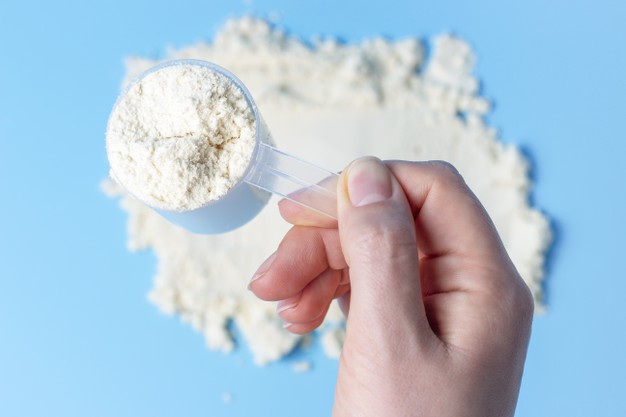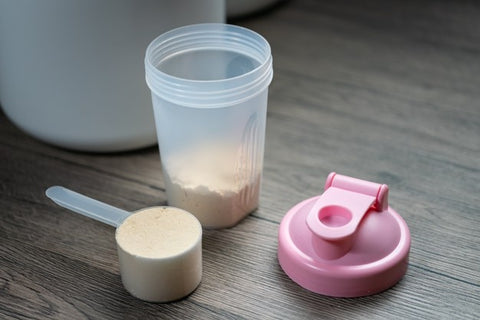
Do We Need Added Digestive Enzymes For Digesting Whey?

By now, all of us have read, understood and have personally witnessed the scope of Whey in the muscle building arena.
If you can think of the most bioavailable protein or a most convenient source of dietary protein, it is simply Whey, Whey and Whey!
But what we don’t understand about Whey is, despite having so many merits to its credit, there has long been an argument that ‘Whey Protein consumption is a waste without added digestive enzymes’ and the counter-argument that says, ‘What is the need for added enzymes when our body already has all the necessary enzymes?’
Although both arguments appear worth considering, it’s time we need to be sure and know the truth!
Let’s unfold the puzzle with a step-by-step understanding:
Why Is Whey Protein Deemed As The Best Post-Workout Supplement?
As the supplement industry is growing with several varieties of proteins, Whey Protein is still by far the most preferred one. Whey Protein features the highest biological value (BV) among all other protein sources, with Whey Protein Concentrate having a BV of 104 and Whey Protein Isolate with a BV of 159 respectively.
The measure of how well a protein source is absorbed and utilized by the body determines its biological value.
With this fact, we come to know that Whey Protein is an easily absorbable and a fast digesting protein, although this is reliant on the proper digestive enzymes too. According to experts in muscle development, our body can absorb Whey Protein at a rate of 8g to 10g/hour, which varies from person to person and is influenced by the level of digestive enzymes.
Digestion Of Whey
Our digestive system doesn’t absorb the food we eat as it is, it absorbs only the nutrients. (For example, the carbohydrates need to be broken down into simple sugars, fats into fatty acids and proteins into amino acids).
We must first understand that protein digestion is a complicated process, which begins in the stomach and ends in the intestine.
As we know, Proteins are the complex chain of amino acids, Whey Protein like any other protein needs to be broken down in to easily absorbable amino acids upon ingestion. Enzymes are the main players behind this long process. In our body, digestive enzymes are produced by the pancreas and liver and released to digest the food coming from the stomach.
The 5 most important enzymes released include:
Amylase- that digest carbohydrates.
Protease- that breaks down protein into constituent amino acids.
Lipase- that breaks down fats into fatty acids.
Cellulase- that digests fiber from grains.
Lactase- that digests milk proteins.
All these enzymes play a vital role in improved nutrient absorption and help our body to make the superior use of amino acids so the muscles can put them to best use.
Related Article: Top 10 Myths Vs Facts On Whey Protein
Then Why Do We Encounter Digestive Complaints With Whey?
Whey Protein although is regarded as the most bioavailable protein which contributes to satiety, we often encounter issues pertaining to problems with digestion of Whey or rather our ability to utilize Whey is diminished sometimes!
Let’s know why?
1. Overdosage
A basic understanding is that our digestive system is designed/equipped to handle a certain amount of food. Over-eating or consuming too much food no doubt will overwhelm the gastrointestinal tract to process it. The same is what happens when we consume too much Whey. The digestive enzymes specific to that macronutrient may not be able to keep up the overdosage. This means that one of the prime causes for indigestion/bloating associated with Whey occurs as a result of the backlog of Whey. This condition prevails until our body processes the accumulated protein.
2. Lactose Intolerance
An inability or decreased ability to digest Whey is a one-line definition for lactose intolerance.
Lactose is nothing but a type of sugar molecule composed of 2 smaller molecules, glucose and galactose. We need lactase to digest lactose. Adequate lactase breaks down lactose into their constituent units glucose and galactose.
Generally, milk and milk derivatives like curds, cheese, butter, casein, whey, and dry milk solids contain lactose.
Lactose intolerance is a condition seen in those whose small intestine doesn’t produce enough lactase to digest lactose. This condition is generally hereditary or sometimes it may develop with age when the small intestine starts making less lactase.
Wondering what happens to the lactose?
Such times, the ingested lactose doesn’t get digested in the stomach or small intestine. Instead, it is broken down by bacteria in the colon, which creates a gas problem, bloating, abdominal discomfort, cramps, and diarrhoea in lactose-intolerant people. Lactose intolerance although not dangerous is certainly distressing.
3. Dairy Allergy
Yet another probable reason for the non-digestibility of Whey could be a dairy allergy. It is a condition wherein we are allergic to certain proteins in milk.
A certain people who may not be aware of this, complain that they find difficulty in digesting Whey.
4. Miscellaneous Reasons
Our busy lifestyle is also the major reason on the list which could lead to impaired digestion. Due to decreased production of digestive enzymes, amino acid absorption gets low and the result is, reduced recovery from training and not getting the expected muscle strength.
Apart from this, pre-existing digestive disorders, surgery, medical ailments, poor diet practice, stress, use of acid-blocking medications, Zn- deficiency are few of the major reasons accountable for causing hardships in digestion in whey.
After having learnt about the digestion of Whey and several causes that leads to its inappropriate digestion, let’s come to the main topic of debate now.
Do We Need External Enzymes To Digest Whey?
Without getting into the confusion that could complicate things, let’s apply a little logic here!
Now, all of us have been drinking milk(with a few exceptions) from our childhood. Haven’t we grown up digesting milk? As discussed earlier, Whey is a byproduct of milk, a liquid that is strained to form cheese. The puzzle is getting simpler, don’t you think? Consuming Whey is not much different than drinking milk. If we could digest milk, so can we digest Whey!
The main purpose of using Whey is to fill in the protein gaps and to get more muscle strength. External enzymes have got nothing to do in this scenario.
Related Article: Is Foaming In Whey Protein Causing You a Concern?
Why Do Certain People Emphasize Added Digestive Enzymes?
We are often misled by the false statement ‘you are not absorbing the maximum amount of protein without the aid of added digestive enzymes’. This is more like adding extra preservatives and extending the shelf life of the product, which is not correct! We must rule out conflicting opinions forever.
If you were given a choice to choose between natural air and polluted air, what would be your choice? The answer would undoubtedly be natural air. That’s because it is more healthy, antitoxic and pure!
Similarly, added enzymes are like additives/pollutant which carries hidden dangers upon which companies never bother to shed light!
Did you know? The added enzymes could lead to chest tightness, wheezing, rash, diarrhoea, vomiting, cough, heartburn, swelling of the abdomen, high amount of uric acid in the blood and in rare cases would lead to gallstones.
Related Article: Amino Spiking in Whey - What's It? Is Your Protein Clean?
It's Time We Seal The Conflicting Opinions Forever!
Digestive enzymes make you feel you are digesting better initially, but it won’t take much time for you to realize that you are getting dependent on them.
Instead, we need to follow our tradition and look for an alternate harmless remedy.
Apples, celery, fenugreek, olive oil, cinnamon, lemon juice, greens, are found to promote healthy bile flow and increase bile and pancreatic enzymes. Another useful idea would be to drink a big glass of water 15-20 minutes before each meal which will super hydrate your stomach, encouraging it to promote more HCl and increase the production of bile and pancreatic enzymes.
In the end, never ignore your health in the quest of bodybuilding!
After all, good health is the result of the choice we make...Be sure your choice is pure...
Also Read: Should you consume Whey with milk or water
 Follow Our Instagram Page For The Latest Updates: badalkhudko
Follow Our Instagram Page For The Latest Updates: badalkhudko
Subscribe to AS-IT-IS Nutrition - Blog by Email













Leave a comment